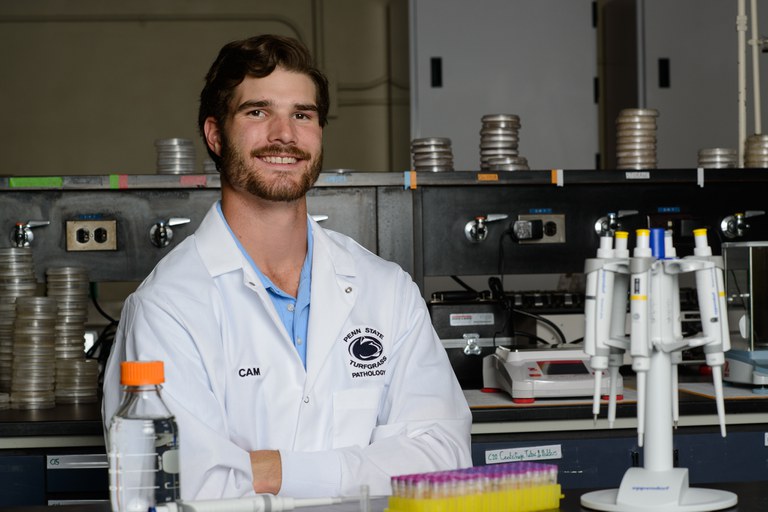Posted: December 9, 2017
Cameron Stephens reflects on successfully passing his MS defense and graduating from Penn State.
Shortly after arriving in State College, I found myself already anticipating the thesis defense. While I had not yet designed an experiment, formulated a proposal, or chosen a committee, I was eager to conduct research that would progress our scientific knowledge of a pathosystem and also be beneficial to the end user.
Dr. Kaminski and I developed research objectives that focused on fungicide resistance in Sclerotinia homoeocarpa populations and the potential association between vegetative compatibility groups (VCGs) and fungicide resistance or insensitivity. Results indicated that fungicide resistant or insensitive S. homoeocarpa isolates were common throughout PA and the surrounding region when evaluated in vitro against four commonly used fungicides (boscalid, iprodione, propiconazole, and thiophanate-methyl). A total of 86% of isolates exhibited insensitivity to at least two of the active ingredients suggesting multidrug resistance is prevalent. A total of 9 of 11 known VCGs were recovered, however the majority of isolates belonged to VCGs B, C, and K. Of the 673 isolates evaluated in the VCG assay, 110 were incompatible with all known VCGs and may represent a greater level of VCG diversity than previously reported. Isolates belonging to different VCGs also exhibited differential in vitro insensitivities. For example, isolates belonging to VCG E, F, and G exhibited the highest levels of insensitivity to boscalid, iprodione, and propiconazole. I was pleasantly surprised by our results and I believe these data have direct implications for turfgrass managers throughout the state of PA.
After obtaining an abundance of data, conducting analysis, and weeks of writing, I was eager to defend my thesis. To me, the defense was a culmination of all the hard work I had put in over the past two years so I was looking forward to the opportunity. In preparation I was nervous and kept trying to anticipate questions, but I found the most useful tactic to a successful defense was being confident in my methods and results. I successfully defended my thesis on December 7th and I found the process to be challenging, thought provoking, and very rewarding.
My thesis would not be what is without the guidance and support from Dr. Kaminski, my committee members, and my professional mentors. Upon graduation I will be making my way down to Raleigh, North Carolina to pursue a Ph.D. at NC State. I am looking forward to the next opportunity as I strive towards making an impact in the turfgrass industry and continue my training as a plant pathologist.
- Cameron Stephens, Class of 2018


